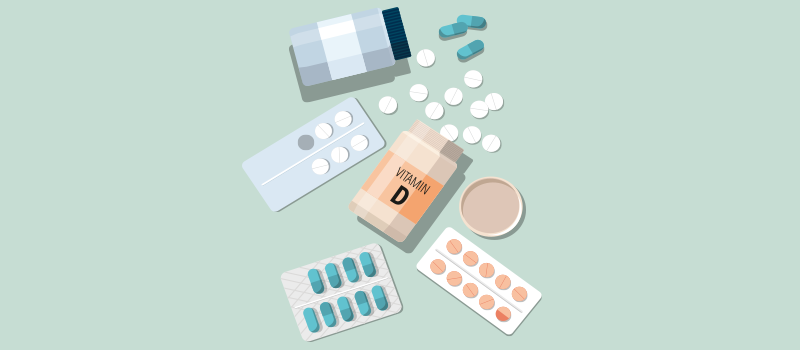What’s the Buzz
The Bee Healthy Blog
Vitamin D and Breast Cancer: Can It Help to Prevent?

Vitamin D is a fat-soluble vitamin present in some foods and can also be obtained from dietary supplements. The body makes vitamin D when the skin is exposed to UV rays in sunlight. A key role of vitamin D in the body is promoting calcium absorption from the gut. In people with a vitamin D deficiency, the bones can become thin, brittle, or misshapen due to calcium deficiency.
Besides bone health, adequate vitamin D levels are also necessary for many other vital processes in the body, including cell growth, immune function, glucose metabolism, and reduction in inflammation. Studies also suggest that vitamin D might have an anti-cancer effect. Please continue reading to learn whether vitamin D can reduce the risk for breast cancer.
Does vitamin D reduce breast cancer risk?
It appears that vitamin D may reduce breast cancer risk. One study that pooled data from two large randomized clinical trials found that higher vitamin D levels were associated with an 80% lower risk of breast cancer. The study looked at more than 5,000 women with an average age of 63 years. The results found that the women with a vitamin D level of 60 ng/mL or more had one-fifth the risk of breast cancer compared to women with less than 20 ng/mL.
Interestingly, the U.S. Institute of Medicine says a level of 20 ng/mL is enough vitamin D for good bone health. Anything below this is considered a vitamin D deficiency. While this cutoff level remains hotly debated, the study mentioned above suggests that women with higher vitamin D levels have a considerably lower risk for breast cancer diagnosis.
How much vitamin D do you need for cancer prevention?
As mentioned, a vitamin D level of 60 ng/mL might lead to a lower risk of breast cancer. Levels of vitamin D can be increased with vitamin D supplements or sun exposure. Experts say that to reach a vitamin D level of 60 ng/mL, people generally need dietary vitamin D supplements of 4,000-6,000 International Units (IU) per day along with moderate sun exposure (10-15 minutes outdoors around noontime with minimal clothing).
The current recommendation from the National Institutes of Health Office of Dietary Supplements is a daily vitamin D intake of 600 IU per day for children and adults and 800 IU per day for those over 70 years old. The upper limit is 2,000 to 4,000 IU of vitamin D per day. The need for vitamin D supplementation for bone health and cancer prevention should ideally be determined by a blood test during the winter months and medical advice.
Notably, while it is important to get enough vitamin D, excessively high serum levels of vitamin D (over 125 ng/mL) can lead to health problems. For example, vitamin D levels over 125 ng/mL have been linked to a range of adverse side effects and health conditions, including heart rhythm problems, kidney damage, constipation, nausea, and weight loss. For this reason, intake of more than 10,000 IU per day of vitamin D is not recommended except under medical supervision and monitoring.
Does vitamin D deficiency increase the risk of breast cancer?
Research suggests that women with low levels of vitamin D have a higher risk for breast cancer. Vitamin D may control normal breast cells’ growth and stop breast cancer cells from growing. Studies have also shown that vitamin D deficiency can lead to tumor progression and metastasis (spread of breast cancer to other organs).
A strong link has been noted in women with recurrent breast cancer and a vitamin D level below 20 ng/mL. One study showed that women with vitamin D deficiency when their breast cancer was diagnosed had poorer outcomes with higher chances of cancer coming back and death. However, these findings are associative, meaning other factors could have contributed to the poor outcomes.
Can vitamin D prevent cancer?
Low vitamin D blood levels have been linked to several health conditions, including breast cancer. However, while researchers have observed associations, there is no proof of a definitive link. Much of the current research on vitamin D and breast cancer is based on observations and potential associations. Meaning, doctors cannot say with certainty that taking vitamin D supplements will prevent breast cancer or reduce breast cancer risk.
Many clinical trials have looked at women who had breast cancer and found that a large percentage of them have vitamin D deficiency. In addition, several studies have found that 7 to 8 out of 10 women have low blood levels of vitamin D when they are diagnosed with breast cancer. This suggests a possible association between vitamin D and breast cancer. But, given that three-fourths of all Americans might have a vitamin D deficiency, it is difficult to say whether a vitamin deficiency increases a person's breast cancer risk or the deficiency is just present in the general population and therefore also in many cancer patients.
Is vitamin D good for cancer patients?
Research suggests that vitamin D has an even stronger benefit on breast cancer mortality than cancer prevention. Meaning, vitamin D might reduce the risk of death and cancer recurrence in breast cancer patients.
Researchers have arrived at this conclusion by association. It has been found that a deficiency of vitamin D in breast cancer patients is associated with poorer outcomes and increased mortality. In addition, laboratory and animal studies have found that vitamin D may slow tumor progression, decrease tumor invasiveness, and reduce the propensity of tumors to metastasize (spread to other parts of the body).
However, the optimal dosage of vitamin D and target blood levels in breast cancer patients are yet to be determined.
Can you take vitamin D after breast cancer?
Individuals who have had breast cancer (or other cancers) often take dietary supplements to improve overall nutrition and regain strength after treatment, as well as reduce their risk of getting breast cancer again. Many people living with breast cancer take vitamin D supplementation hoping to slow down or reverse the course of the disease.
The truth is that the role of vitamin D in breast cancer prevention is known by association but remains unproven. Meaning, researchers cannot say with certainty that if patients with breast cancer or other cancers take vitamin D supplements, it will lower their risk of cancer recurrence. However, doctors may recommend supplementation for overall health. This can be achieved through foods naturally rich in vitamin D, fortified foods, or a dietary supplement.
What supplements can help prevent breast cancer?
Vitamins, minerals, amino acids, botanicals, and herbs are all labeled as dietary supplements in the United States. A supplement can be taken by mouth and is intended to supplement, not replace a healthy diet. It can be hard to know which supplements might prevent breast cancer. You will hear many different things from family, friends, and the media.
It is important that you seek medical advice before taking any supplement. This is especially true for people with a diagnosis of breast cancer. Such individuals should keep in mind that while some multivitamins and supplements can benefit general health, they might interfere with breast cancer treatment. In general, while a supplement like vitamin D may reduce your risk of breast cancer, no dietary supplement has been proven to prevent, treat, or cure cancer.
References:
- https://ods.od.nih.gov/factsheets/VitaminD-HealthProfessional/
- https://www.sciencedaily.com/releases/2018/06/180615154523.htm
- https://www.health.harvard.edu/blog/vitamin-d-whats-right-level-2016121910893
- https://pubmed.ncbi.nlm.nih.gov/24036014/
- https://www.cancer.gov/news-events/cancer-currents-blog/2016/vitamin-d-metastasis
- https://oregon.providence.org/forms-and-information/a/ask-an-expert-can-vitamin-d-prevent-breast-cancer/
- https://jamanetwork.com/journals/jamanetworkopen/fullarticle/2773074
- https://www.hindawi.com/journals/isrn/2013/483687/











SOCIAL